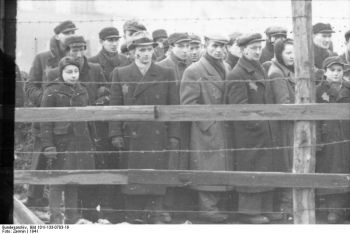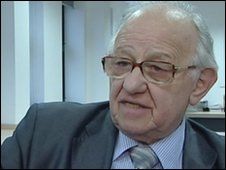Broadcast: News items
Holocaust Memorial Day looks back to the beginnings of Hitler’s power
Posted on behalf of: Centre for German-Jewish Studies
Last updated: Monday, 14 January 2013

Lodz Ghetto, Poland

Zigi Shipper
A dramatic story of survival, and reflections on Hitler’s 1933 appointment as Chancellor of Germany, are on the programme for the University’s annual Holocaust Memorial Day on Wednesday 30 January.
The afternoon, organised by the Centre for German-Jewish Studies, will be introduced by the Mayor for Brighton and Hove, Councillor Bill Randall, and the Vice-Chancellor, Professor Michael Farthing.
The event coincides with the exact date 80 years ago when Hitler became Germany’s Chancellor. Oxford University’s Professor Peter Pulzer, who is the author of several books on German history and politics, including The Rise of Political Antisemitism in Germany and Austria (2004) and Jews and the German State (2003), will ask how the appointment came about, how it was viewed at the time and whether its impact on Europe and particularly its Jews could have been foreseen more accurately than was the case. The discussion will be chaired by the Head of the School of History, Art History and Philosophy, Professor Matthew Cragoe.
The afternoon will also feature a Holocaust survivor’s dramatic story of his teenage years. Polish–born Zigi Shipper and his grandparents were forced to leave their homes and live in the Jewish ghetto in Llodz in 1940. When the ghetto was liquidated in 1944, 14-year-old Zigi was sent to Auschwitz and then to a concentration camp near Danzig.
With the Russians advancing, Zigi and other survivors were sent on a “death march”, finally arriving by barge at the German naval town of Neustadt on the Baltic coast. They believed they would be taken to Denmark, but before this could happen British troops arrived and Zigi and his fellow captives were liberated. He was subsequently fortunate to be reunited with his mother, whom he hadn’t seen since he was five, and came to live in England.
Zigi describes himself as lucky to have survived and feels he owes it to those who did not survive to keep talking about what happened. “Whole families were wiped out,” he says. “Who will tell their story?”
The event will end with the showing of Daisy Asquith’s film, ‘After the Holocaust’, which focuses on the lives of three Holocaust survivors in the decades since the end of the war.
The University of Sussex Holocaust Memorial Day is made possible by the generous support of the Association of Jewish Refugees.
The event, free and open to all, will take place in the Jubilee Building lecture theatre, starting at 1.30pm.

